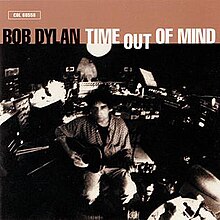| Time Out of Mind | ||||
|---|---|---|---|---|
 | ||||
| Studio album by | ||||
| Released | September 30, 1997 | |||
| Recorded | 1996–1997 | |||
| Studio | Criteria (Miami) | |||
| Genre | ||||
| Length | 72:50 | |||
| Label | Columbia | |||
| Producer | Daniel Lanois | |||
| Bob Dylan chronology | ||||
| ||||
| Singles from Time Out of Mind | ||||
| ||||
Time Out of Mind is the thirtieth studio album by American singer-songwriter Bob Dylan, released on September 30, 1997, through Columbia Records. It was released as a single CD as well as a double studio album on vinyl, his first since The Basement Tapes in 1975.
For many fans and critics, the album marked Dylan's artistic comeback after he appeared to struggle with his musical identity throughout the 1980s; he had not released any original material since Under the Red Sky in 1990. Time Out of Mind is one of Dylan's most acclaimed albums, and it went on to win three Grammy Awards, including Album of the Year in 1998. It was also ranked number 410 on Rolling Stone's 500 Greatest Albums of All Time in 2012.[5]
The album has an atmospheric sound, the work of producer (and past Dylan collaborator) Daniel Lanois, whose innovative work with carefully placed microphones and strategic mixing was detailed by Dylan in his memoir, Chronicles: Volume One. Although Dylan has spoken positively of Lanois' production style, he expressed dissatisfaction with the sound of Time Out of Mind. Dylan has self-produced his subsequent albums.
- ^ Melis, Matt (March 31, 2017). "Ranking: Every Bob Dylan Album From Worst to Best". Consequence. Retrieved February 15, 2023.
Coincidences aside, though, "Love and Theft" cemented Dylan's late-era resurgence, assuring listeners that 1997's Time Out of Mind hadn't been a fluke. Even grittier and dirtier than its blues rock predecessor, the record roars through an old-time South whose gentility has been corrupted and sullied by an album's worth of rogues, scoundrels, and treacherous women who bring only pain.
- ^ a b Breihan, Tom (September 29, 2017). "'Time Out Of Mind' Turns 20". Retrieved December 8, 2019.
The music calls back to ancestral country and roadhouse blues, but it's not a retro sound.
- ^ Sweeting, Adam (September 22, 2000). "Enigma variations". The Guardian. Retrieved December 8, 2019.
If one single event could be identified as triggering the refurbishment of Dylan's fading reputation, it was his 1997 album, Time Out Of Mind. A haunted collection of blues, rockabilly and ballads apparently reaching out from beyond the grave, it confirmed that he hadn't, after all, lost the ability to hypnotise his listeners, nor to mine an indefinable sense of spiritual profundity from the simplest of musical tools.
- ^ "Bob Dylan - Love Sick - dutchcharts.nl".
- ^ "500 Greatest Albums of All Time". Rolling Stone. May 31, 2012. Retrieved September 4, 2019.